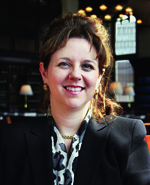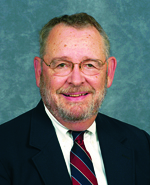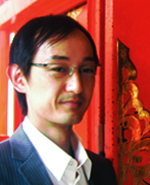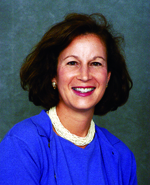As the first Washington University in St. Louis faculty member to receive the Distinguished Alexis de Tocqueville Chair of the Fulbright Scholarship program, Leila Nadya Sadat, JD, will help expand WUSTL’s worldwide partnerships.
Sadat, the Henry H. Oberschelp Professor of Law and Director of the Whitney R. Harris World Law Institute, is one of four School of Law faculty to receive Fulbright awards. The others are Dorsey D. Ellis Jr., JD, dean emeritus and the William R. Orthwein Distinguished Professor of Law Emeritus; David Law, JD, PhD, professor of law and of political science in Arts & Sciences; and Jo Ellen Lewis, JD, professor of practice and director of the Legal Practice Program.

Sadat
Sadat will teach one course in French and another in English to international graduate students in the spring of 2011 at the University of Cergy-Pontoise in France. In related speaking engagements, including a lecture at the Conseil d’Etat, one of France’s two supreme courts, she will focus on her celebrated work regarding the International Criminal Court (ICC).
In numerous publications, Sadat has examined international law issues across a broad spectrum. These include the ICC, amnesties for international crimes and the legal framework applicable to the U.S. “war on terror,” particularly in regard to the treatment of detainees.
“The Tocqueville Chair recipient lectures to a distinguished audience at several points during his or her term and a research colloquium is organized around the interests of the Tocqueville Chair by the host university,” Sadat says. “In my case, the colloquium undoubtedly will be on comparative U.S. and European perspectives and outlooks on the ICC and public international law more generally, although the precise topic remains to be decided.”
Sadat, who earned law degrees from Tulane University, Columbia University and the University of Paris–Sorbonne, hopes her Fulbright experience will foster relationships between WUSTL and institutions of higher education in France.
“The Washington University School of Law has no Francophone partners at this point in time, making this collaboration particularly important given the strong interest amongst our students in studying in French and in France,” Sadat says.
The Fulbright program awards its distinguished chairs to renowned scholars set apart by significant experience and extensive publications in their fields. The Alexis de Tocqueville Chair was established in 2005. Sadat is the first woman honored with this award.
Ellis: Strengthening bonds, fine-tuning skills in Portugal
Further cementing WUSTL’s ties with Lisbon’s Catholic University of Portugal will be a lasting impact of Ellis’ 2010-2011 Fulbright grant.

Next spring, Ellis will teach two graduate classes, “Antitrust Law” and “International and Comparative Competition Law” at the university.
“This should improve our ability to cooperate with Lisbon’s law school as part of the Transnational Law Program,” Ellis says. “Perhaps I will be successful in recruiting more of their students to the program.”
In the past, Ellis has taught in Belgium, Japan, Netherlands, New Zealand, Taiwan and the United Kingdom. Working with law students from a broader range of European nations as well as other countries will add to Ellis’ expertise when he returns to teach his antitrust comparative law course at WUSTL.
“I expect to increase my understanding of competition law as it is enforced in other parts of the world, especially in Europe,” Ellis says. “That should enhance my ability to teach competition law systems outside the United States, which is becoming increasingly important for American lawyers to understand.”
Law: Can human rights support become a competitive edge for Taiwan?
Law will become the first WUSTL faculty member to visit National Taiwan University’s College of Law in Taipei.

This fall, he will conduct research on the globalization of constitutional law and the inner workings of Taiwan’s Constitutional Court.
The specific questions he will explore include: To what extent does constitutional law in Taiwan double as a form of national security policy; would the process of democratization drive judges in previously authoritarian regimes to borrow constitutionally from more democratic countries; and does global competition for investment or human capital give states an economic incentive to respect certain constitutional rights?
“Taiwan will increasingly struggle to retain capital and talent in the face of competition with China,” Law says. “One competitive advantage Taiwan might have is its respect for basic rights or, at least, its ability to lead people to believe it respects basic rights.”
Law’s research in Taiwan will form part of a book on the globalization of constitutional law that builds upon his previous research in this area, including his 2008 article “Globalization and the Future of Constitutional Rights.”
Lewis: Different laws, similar concerns in China
Lewis returned in May from China with a broader understanding of international law students and legal education in China.

Lewis
A Fulbright Senior Specialist Grant took her to Shanghai’s Fudan University, with which WUSTL has a strong relationship. At Fudan’s School of Law, Lewis taught two courses, “Legal English” to graduate law students and “Introduction to Torts” to undergraduate law students.
“China is a civil law country; we are a common law country,” Lewis says. “The law is very different there but our concerns and our interests are similar in areas like legal issues, legal education and representation of clients.”
This and previous trips to Japan and South Korea have left Lewis with a wider perspective to share with international law students and those who are interested in international legal and educational issues.
“It’s one thing to read about a culture, it’s another to live in it,” Lewis says.
The Fulbright Scholarship program, the world’s largest international educational exchange, was founded in 1946.
A story on Arts & Sciences faculty who have received Fulbright awards is forthcoming.